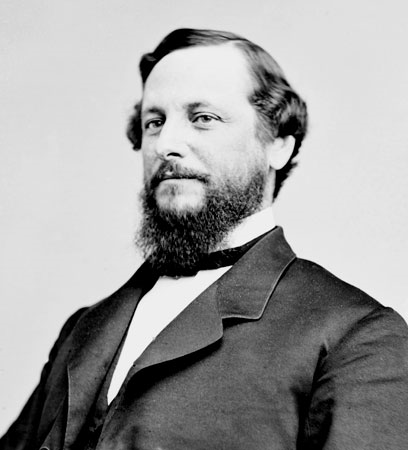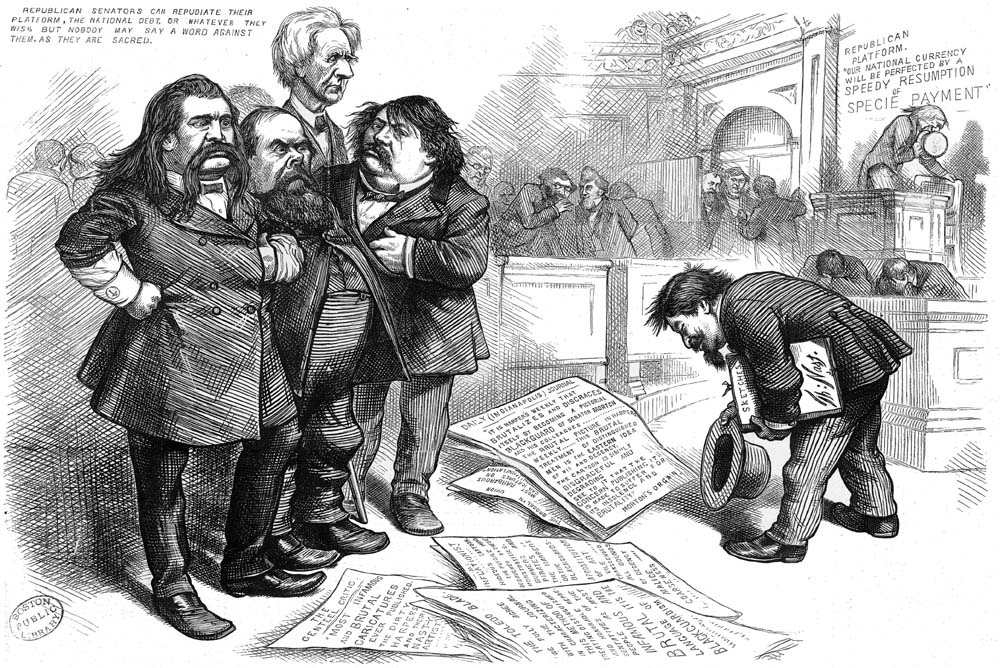
Samuel Gompers, founder of the American Federation of Labor
While engaging in political research through the excellent newspapers.com, I found that the American Federation of Labor had graded representatives in Congress based on what they thought of as “pro-labor”. Specifically, they laid out 16 key votes in an advertisement against Congressman Joseph Deal (D-Va.) for his “unfavorable to labor” record. The votes were:
- Nolan Amendment to Seamen’s Bill
Rep. John Nolan (R-Calif.) amendment to the Seaman’s bill which reduces maximum hours for oilers, watertenders, and firemen on vessels from 12 to 8 hours a day.Adopted 166-113: R 98-91; D 67-21; IR 0-1; S 1-0, 6/15/21.
Yea = +, Nay = – - Sheppard-Towner Maternity Aid Bill
Passed 279-39: R 194-24; D 83-15; IR 1-0; S 1-0, 11/19/21.
Yea = +, Nay = – - Adjusted Compensation for World War I Veterans
Passed 333-70: R 241-42; D 90-28; IR 1-0; S 1-0, 3/23/22.
Yea = +, Nay = –
4. Extending the Emergency Quotas of the Immigration Act of 1921
Passage of the bill extending the Emergency Quota Act, limiting immigration of nationalities to 3% of their population in the U.S.
Passed 258-26: R 180-17; D 78-8; S 0-1, 5/2/22.
Yea = +, Nay = –
5. Override President Harding’s Veto of Adjusted Compensation for World War I Veterans
Veto overridden 258-54: R 187-35; D 69-19; IR 1-0; S 1-0, 9/20/22.
Yea = +, Nay = –
6. Underhill Worker’s Compensation Bill for D.C.
Passage of the Underhill Worker’s Compensation bill for Washington D.C. which permits private worker’s compensation firms and limits payments to dependents in case of death to a maximum of eight years and $5000. as opposed to the Fitzgerald bill, which renders Worker’s Compensation run by government only and lacks such a cap.
Passed 137-126: R 98-82; D 38-43; IR 1-0; S 0-1, 1/22/23.
Yea = -, Nay = +
7. Adjusted Compensation for World War I Veterans
Passage of the bill providing servicemen with $1.00 per day served and $1.25 per day served overseas, to be paid out to the veteran in 1945 or to the veteran’s family if the veteran has since died.
Passed 355-54: R 175-34; D 177-20; F 2-0; S 1-0, 3/18/24.
Yea = +, Nay = –
8. Immigration Act of 1924
Passage of the bill setting a cap of 2% of the population of the 1890 census of nationalities for immigration annually.
Passed 323-71: R 163-33; D 158-37; F 2-0; S 0-1, 4/12/24.
Yea = +, Nay = –
9. Child Labor Amendment
Adoption of the Constitutional amendment granting Congress the power to limit and abolish child labor.
Adopted 297-69: R 168-13; D 127-56; F 1-0; S 1-0, 4/26/24.
Yea = +, Nay = –
10. Discharge the Howell-Barkley Bill
Rep. Alben Barkley (D-Ky.) motion to discharge the Howell-Barkley bill from the Committee on Interstate and Foreign Commerce. This measure repeals the Railroad Labor Board, which proponents of this legislation charged with being biased towards railroads over labor in its rulings and substitutes it with four national adjustment boards to mediate and settle labor disputes and because it would only provide for representation on the side of labor for unions, opponents charged that it would essentially result in a “closed shop”.
Passed 194-181: R 40-153; D 151-28; FL 2-0; S 1-0, 5/5/24.
Yea = +, Nay = –
11. Override President Coolidge’s Veto of Adjusted Compensation for World War I Veterans
Veto overridden 313-78: R 145-57; D 166-21; F 1-0; S 1-0, 5/17/24.
Yea = +, Nay = –
12. Strike Enacting Clause from Howell-Barkley Bill
Rep. Everett Sanders (R-Ind.) motion to agree to the recommendation of the Committee on Interstate and Foreign Commerce and strike the enacting clause of the bill, thus defeating it for the session. Despite the defeat of this effort, Howell-Barkley ultimately did not reach the President’s desk.
Defeated 160-188: R 133-45; D 27-140; FL 0-2; S 0-1, 5/19/24.
Yea = -, Nay = +
13. Postal Workers Salary Bill
Adoption of the conference report of the Postal Workers Salary bill, including the Cable corrupt practices amendment.
Adopted 361-6: R 185-6; D 173-0; F 2-0; S 1-0, 6/6/24.
Yea = +, Nay = –
14. Railway Labor Act
Passage of the bill abolishing the Railroad Labor Board and instead providing for collective bargaining. Passed 381-13: R 220-5; D 157-8; F 3-0; AL 1-0, 3/1/26.
Yea = +, Nay = –
15. Bar Interstate Sales of Certain Prisoner Produced Goods
Passage of the bill preventing free labor from having to compete with prisoner-produced goods.
Passed 303-39; R 160-20; D 140-19; F 2-0; S 1-0, 5/15/28.
Yea = +, Nay = –
16. Override President Coolidge’s Veto of Postal Service Pay Bill
Passage, over President Coolidge’s veto, of the bill providing for higher pay for night work in the postal service.
Veto overridden 320-42: R 161-39; D 156-3; F 2-0; S 1-0, 5/22/28.
Yea = +, Nay = –
On only one occasion of these 16 votes did Congress’s vote go against the preference of the American Federation of Labor. However, it is true that what ended up getting enacted was a bit less. The first bonus bill, for instance, didn’t overcome President Harding’s veto, the Child Labor Amendment was never ratified by the states, and the Howell-Barkley bill of the 68th Congress was ultimately defeated, resulting in the compromise measure passed in the next Congress. What’s more, a few of these votes have overwhelming majorities for them, such as the bill for postal workers salaries in 1924 and the Railway Labor Act in 1926. No legislator who voted more than twice and served beyond the 67th Congress scored a 0%. Although there are some votes that could fit into our understanding of conservatism and liberalism, there are others that are poor fits. For instance, you’d be hard-pressed to find a liberal in modern times who would defend the national origins quota system enacted by the Immigration Act of 1924, but the AFL was all for it. Immigration as an issue for labor is the sole reason that Socialists Meyer London of New York and Victor Berger of Wisconsin don’t get 100% by their standards.
It is also interesting how numerous individuals who in the 1920s were, by this standard, staunch friends of labor would later be considered enemies by FDR, New Dealers, and the Congress of Industrial Organizations. Republican Hamilton Fish of New York votes with the AFL on 11 out of the 12 issues he voted on, thus 92%. Democrat John Rankin of Mississippi voted with the AFL on 15 out of the 15 issues he voted on, 100%. Both men would be considered foes of organized labor during the Roosevelt Administration. Some are more predictive; John Nance Garner’s (D-Tex.) score of 69% is one of the weaker ones among Texans and seems predictive of his turn against organized labor as vice president, particularly when it came to sit-down strikes. The worst scorers were mostly Republicans but a few Southern Democrats made the cut too, a bit of a foretelling of the Conservative Coalition that was to arise after the 1938 midterms in which one of their strongest matters of unity was in curbing the power of organized labor after the enactment of the 1935 Wagner Act. A 100% score for some legislators doesn’t guarantee a liberal record overall; Simeon Fess of Ohio gets such a score because of his votes on veterans in 1922, his vote for Sheppard-Towner in 1921, and his vote for extending emergency immigration quotas. Fess was known as a big foe of the New Deal as a senator and it cost him reelection.
Something else to note about the 1920s was that this was before the time in which the liberal-labor coalition came to fruition. Although labor unions had been quite supportive of Wilson, it was with FDR that this bond firmly formed and it was doubled down on with the rise of Walter Reuther, a man with a socialist past, of United Auto Workers. What’s more, how the regions fared were quite different on labor. New England had a lot of Republican legislators who were opposing numerous AFL-backed measures. Interestingly, the South (meaning former Confederacy) does well by AFL standards, although Virginia barely scrapes past 50% in approval of such measures and Texas’ 74% reflects some significant dissent among certain representatives. The states and regions averaged on approval of AFL’s position:
Border:
Ky.: 88%
Md.: 73%
Mo.: 87%
Okla.: 89%
W.V.: 91%
Average: 86%
Middle Atlantic:
Del.: 43%
N.J.: 65%
N.Y.: 69%
Pa.: 75%
Average: 63%
Midwest:
Ill.: 83%
Ind.: 85%
Iowa: 88%
Kan.: 83%
Mich.: 81%
Minn.: 84%
Neb.: 83%
N.D.: 89%
Ohio: 82%
S.D.: 81%
Wis.: 93%
Average: 85%
Mountain States:
Ariz.: 100%
Colo.: 86%
Idaho: 71%
Mont.: 97%
N.M.: 100%
Nev.: 100%
Utah: 88%
Wyo.: 89%
Average: 91%
New England:
Conn.: 40%
Me.: 68%
Mass.: 63%
N.H.: 53%
Vt.: 55%
R.I.: 70%
Average: 58%
South:
Ala.: 82%
Ark.: 94%
Fla.: 87%
Ga.: 84%
La.: 89%
Miss.: 70%
N.C.: 88%
S.C.: 86%
Tenn.: 81%
Tex.: 74%
Va.: 51%
Average: 81%
West Coast:
Calif.: 91%
Ore.: 64%
Wash.: 89%
Average: 81%
American Federation of Labor Scorecard:
References
Mr. Deal Calls for the Record — Well, Here It Is (Advertisement). (1928, August 5). The Portsmouth Star, 16.
Retrieved from
https://www.newspapers.com/image/907231668/













